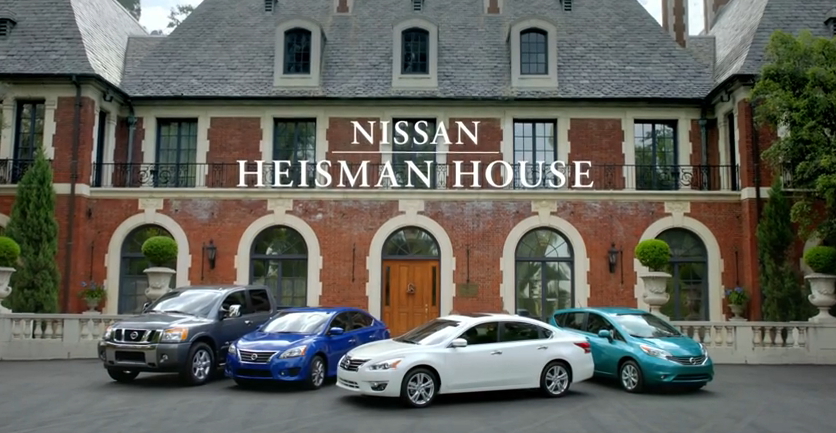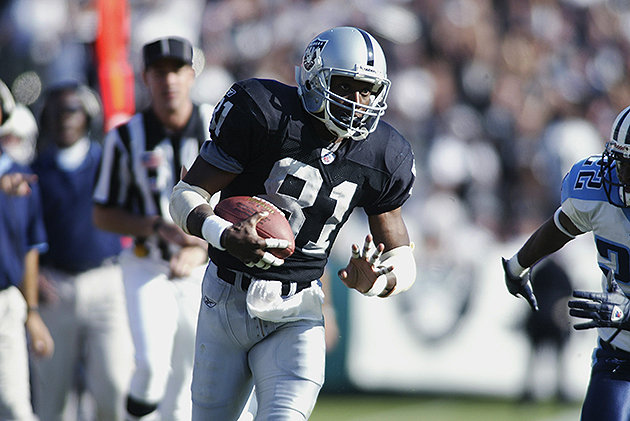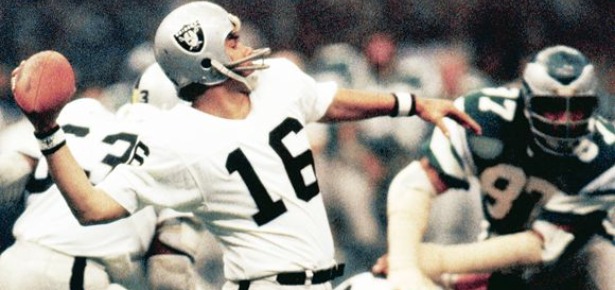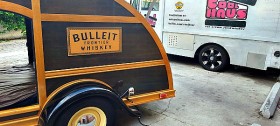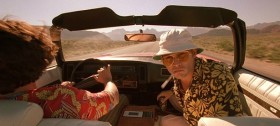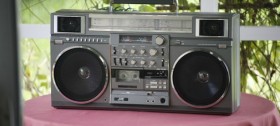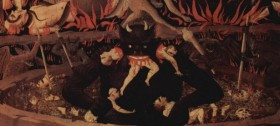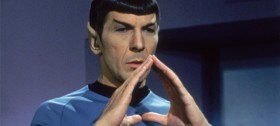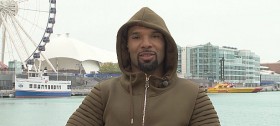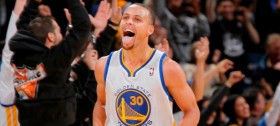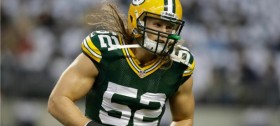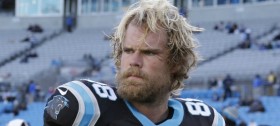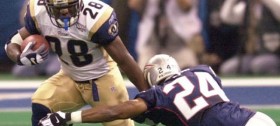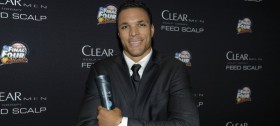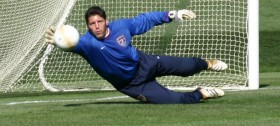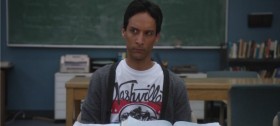Posts tagged Heisman Trophy

What If Heisman Trophy Winners Started Getting Real?
This is the true story of seven strangers…..no make that 14 Heisman Trophy winners picked to live in a house, work together and have their lives taped, to find out what happens when people stop being polite… and start getting real. For those remember the early years of MTV’s Real World that was intro from their show.
Now Nissan is doing something similar. They put 14 Heisman Trophy legends under the same roof. The start of the 2015 season means it’s time for us to once again check in on roommates of the Nissan Heisman House!
The Heisman House campaign, which supports Nissan’s long-standing partnership with the Heisman Trophy Trust, is now entering its fifth season. This year’s spots introduce a few newcomers including Steve Spurrier, Jim Plunkett and 2014 Heisman Trophy Winner Marcus Mariota. Other Heisman winners appearing in the campaign include returning members Robert Griffin III, Johnny Manziel, Sam Bradford, Tony Dorsett, Eddie George, George Rogers, Troy Smith, Roger Staubach, Vinny Testaverde, Herschel Walker and Charles Woodson.
Here are two spots from the upcoming season. Enjoy!
Artwork:
Just Go With It:
Sep 2nd

Tim Brown talks NFL, Notre Dame, and Raiders
Heisman Trophy winner Tim Brown has proved that he was one of the top NFL receivers during his days with the Oakland Raiders. The nine time Pro Bowler scored 105 touchdowns during his NFL career. He entered the College Football Hall of Fame in 2009 and was awarded the 2012 NCAA Silver Anniversary Award.
Brown, who had over 1,000 receptions in the NFL still does a lot after he retired from the game. Brown is the National Chairman for the 911 for Kids organization that educates kids on the proper use of using the 911 emergency service.
I was able to chat with Tim about his days at Notre Dame and in Oakland, golf events, and his work with 911 for Kids.
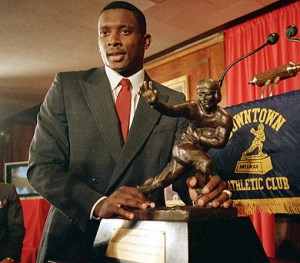 Art Eddy: You had an outstanding career in the NFL and in college at Notre Dame. Was winning the Heisman Trophy the top highlight of your career?
Art Eddy: You had an outstanding career in the NFL and in college at Notre Dame. Was winning the Heisman Trophy the top highlight of your career?
Tim Brown: Certainly it is the thing that I am known for. Maybe when or if I get into the Hall of Fame that will all change. As I sit here right now and people speak of Tim Brown they usually start out by saying Heisman Trophy winner, Tim Brown. I think from that standpoint absolutely it has been the biggest accomplishment so far.
AE: What was it like to play for Lou Holtz at Notre Dame?
TB: Well it was everything man. When Lou got there I was just a guy on the team. I was headed nowhere as far as football goes. Some inspirational talks with him, one on one for a couple of weeks straight changed my whole mindset towards football.
He kept telling me every day that I could be the best player in the country and not just on Notre Dame’s team. It took me a minute to believe that, but he was showing me what I was doing in practice on a day to day basis. By the end of two weeks I got to a point where I believed everything he was saying. Now it was up to me to go out and work on it. I decided to do that and things worked out pretty good. Every time I see him I bow down to him because if it wasn’t for him there is not Tim Brown Heisman Trophy winner.
AE: As I stated earlier you excelled in both the NFL and in college. Was there anything that surprised you from your transition from the collegiate level to the NFL?
TB: I think that thing that surprised me the most was that how great the athletes were at every position. The offensive tackles could run and do the things that you weren’t used to seeing the guys do in college. It was just amazing and you realize this is a whole different league here. You see everybody do what you thought no one else could do but yourself. So I think that was thing that surprised me the most was how great the athletes were.
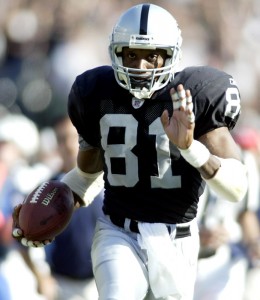 AE: What stands out for you most playing for a team like the Oakland Raiders?
AE: What stands out for you most playing for a team like the Oakland Raiders?
TB: The relationship I had with the fans. I think I had a relationship with Raider Nation that was second to none. Even after I played with the Raiders. The communication we had through my radio show, me being around town for 15, 16 years, and even I had the taste of Raider Nation in Los Angeles and Oakland.
I tell people that was part of me staying in Oakland. I had a couple opportunities like in the 1994 offseason where I signed with (Denver) Broncos and the Raiders matched that contract. Even after that I had two or three opportunities for me to leave. Part of the reasons for me not leaving was that I loved when I walked into the stadium, or when I walked into the mall, or when I walked into a restaurant, people loved me.
There was never a time where a Raider fan came up to me and said something negative. I think from that standpoint it gave me a sense of comfort that I just didn’t think I could build that over three or four years in some other city. That was a big, big part for me why I stayed in Oakland.
AE: Which teams did you look forward to playing against the most?
TB: Denver man. I hated the Broncos so bad. People asked me, why would you sign with them if you hate them so bad? I would say maybe because the money was too good to turn down. The Broncos were definitely the team that we looked forward to playing a couple times a year, every year.
San Diego also. For years we couldn’t beat Kansas City. So I couldn’t say that was a team we looked forward to playing. Certainly towards the end of my career when we turned things around a little bit all the AFC West, all of the three teams were something that we looked forward to.
AE: You made it to the Pro Bowl nine times. What are your thoughts on the new changes the NFL has made to that game?
TB: They are trying to do whatever they can do to keep interest for everyone playing. I do believe that this would generate more interest, but I think it will only be until the ball is kicked off. Once the ball is kicked off you are going to see the same type of football you have been seeing.
It is so much different from what it used to be. You have some players who have some nice contracts because they are Pro Bowl players. They were making millions and millions of dollars. Even towards the end of my career there may have been guys who made three or four million dollars. There were not guys making nine, ten, eleven, or twelve million dollars.
Now you have guys making that. It makes it almost impossible to say I am going to put this on the line, put my eleven million dollar salary that I got coming up next year on the line for a game that doesn’t mean anything. It is going to be very difficult for the NFL to make that game the game it used to be. Unless you pay the guys what they make per week that week, you are not going to see that much effort.
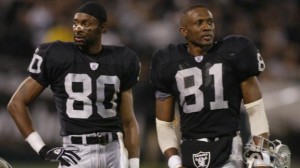 AE: You got to play with a lot of great players like Marcus Allen, Bo Jackson, Howie Long, and Jerry Rice. How fun was it to play with those guys?
AE: You got to play with a lot of great players like Marcus Allen, Bo Jackson, Howie Long, and Jerry Rice. How fun was it to play with those guys?
TB: It was great. Marcus really taught me how to play the game at a high level. How to deal with all the stuff you have to deal with. It wasn’t like he sat down and talked to me about this stuff. Just watching everything he dealt with the Raiders. How he kept practicing hard and playing great was something that could inspire anybody who paid attention to what he was doing to inspire you to another level.
Bo was just an incredible freak of an athlete. I just don’t think that there will be anybody to play the game the way like Bo Jackson again. You got Howie, who is the hardest working guy. He wasn’t the most talkative guy, but he led by example.
Having to be able to finish out my career with the Raiders with Jerry was super special. It was super special simply because for once in my career I had a guy on the other side who could garner the same or even more attention than I was getting. It freed me up to do some things. I had a great, great time with Jerry for those three years. For him to say he was coming over to help me get to the Super Bowl and actually accomplish that was amazing.
AE: I love the work you do with the 911 for Kids program as the National Chairman. How did you start working with that organization and tell me about the great work that this organization provides to the community?
TB: The true story behind that is I was in the locker room one day. Howie Long came in yelling my name. ‘Where’s Tim Brown?’ He didn’t sound like he was happy either. I was really trying to hide from him. In the locker rooms we had in El Segundo was a converted elementary school. All the rooms were very small. There were not that many places to hide. So I was moving around one corner and he did the same.
He put his finger in my chest and said, ‘Hey kid at the end of this year I am going to retire and you are going to take over for me.’ I was so scared I didn’t know what to say, but yes. I felt at that time it was the appropriate thing to do. I later found out that what he wanted me to take over for him was the being the National Chairman for the 911 for Kids. That was in 1993.
We have been going for more than 20 years. We have reached over 5 million kids with our program. Teaching kids the proper of how to use 911. We have awarded hundreds of hero awards to kids who have used 911 to save a family member or a friend. It has been an incredible program. It is a feel good effort on our part and live saving on these kids part. It has worked out great.
AE: What are some of the events that your organization does each year?
TB: We do a golf event every year. We hold the event at The St. Regis resort in Laguna Niguel. Every year we do a miniature minicamp. Three or four of those up and down the coast of California. We would love to have more volunteers for our minicamp and more sponsors for our golf tournament. It just makes it all go better.
Aug 25th

Interview with Former Heisman Winner and Super Bowl MVP Jim Plunkett
The Heisman Trophy will be awarded this weekend to the best player in college football, and I had a chance to speak to a former recipient of college football’s top honors, Jim Plunkett. Plunkett had quite an interesting football career. He was super-hyped coming out of Stanford, he won the Heisman in 1970, and he was selected by the New England Patriots with the first overall pick in 1971.
Plunkett started 14 games for the Pats in 1971 and completed just 48 percent of his passes while compiling a record of 6-8. The following year, Plunkett threw eight touchdowns and 25 interceptions, and lost 11 out of the 14 games he started. Plunkett struggled with injuries over the next few seasons, and in 1975, the year the Patriots drafted Steve Grogan, Plunkett was traded to the 49ers. Plunkett’s tenure in San Francisco started well (he led the team to a 6-1 record), but the Niners tailed off and Plunkett was released by the team during the 1978 season.
With his career teetering on journeyman status, Plunkett was picked up by the Raiders in 1978. He served as a backup that year and barely saw the field the following season. When QB Dan Pastorini broke his leg a few weeks into the 1980 season, Plunkett stepped in, led the Raiders to nine wins in 11 games, helped the team earn a wild card berth in the playoffs. He went on to lead the Raiders to a 27-10 victory over Dick Vermiel’s Eagles in Super Bowl XV. Plunkett was 33 years old. He was the first QB to lead a wild card team to Super Bowl victory, and he became the first (and only) player of Latin-American descent to win the Super Bowl MVP.
Plunkett would return to a backup role before an injury to Marc Wilson forced him into the top spot on the depth chart again in 1983. Plunkett responded by leading the Raiders 10 wins in 13 games. The Raiders made the playoffs again and served up a blowout victory over the Redskins in Super Bowl XVIII. Plunkett’s the only NFL QB with two Super Bowl victories to not be enshrined in the Pro Football Hall of Fame. He currently does post-game radio shows and tons of TV work for the Raiders.
During our interview with Plunkett, we chatted about this year’s Heisman trophy ceremony, Stanford QB Andrew Luck, Raiders’ owner Al Davis, today’s pass-happy NFL offenses, his pick for who will take home the Heisman this year, and whether he thinks college football needs a playoff system.
CS: So you won the Heisman Trophy back in 1970.
JP: Back in the Dark Ages, yes.
CS: Can you tell us what it’s like to belong to such an elite fraternity of college football greats?
JP: Well, obviously it’s a great feeling to be chosen among so very few. It’s started in 1935, the first Heisman award, and now they’re up to 76 that are coming up this year. It’s a great feeling, you know. You were selected among so many other certainly very viable athletes back when, for me 1970. Any number of people could have won that, but you were chosen because of what you did on the football field and how you carried yourself off the field. It really means a lot to me as it does to all the other recipients over the years.
CS: Now people are calling Stanford QB Andrew Luck one of the best NFL QB prospects to come out in years, and some coaches said the same thing about you back in the day.
JP: Right.
CS: Do you think Luck is ready to make a big splash in the NFL and what’s it like dealing with those high expectations going in to your pro career?
JP: Well you know number one, yes I do really, truly believe that Andrew Luck is probably the best passing quarterback in college today. I don’t think there’s any doubt about it. I see him almost every week. I was at the Oregon State game. I go to most of the home games, sometimes a road game or two, and he’s head and shoulders above everybody. As far as just passing the football ,there are other quarterbacks who could probably run better obviously, but he runs pretty well as well. He’s got a great feel for the game, a great feel for what’s happening around him and he reads the defense extremely quickly and more often than not goes to the right receiver. He’s got a great arm. He can throw off balances almost as well as he can when he’s stepping into the throw because he’s got that great arm strength. He anticipates well. He’s got some innate abilities. He can sense pressure, get out of trouble, take off and either run or give himself more time by shuffling around. He’s just a great kid and he’s a great football player and it’s just fun to watch the way he executes out there. That being said, whenever you go somewhere, expectations are always high when you’re a front pick if that’s what Andrew will be – and I’m sure he will be, he might even be the very first pick. So when somebody steps into that kind of situation, they’re always scrutinized very heavily, especially if you start off right away. You get paid a lot of money and professional fans in particular expect results right away. That doesn’t always happen but he’s a lot like… there’s a kid over at Saint Louis, I just can’t remember his name right now, out of Oklahoma – San Bradford – who won the Heisman a couple of years ago. He’s in that mold. He’s in the Manning mold, Eli and Peyton. He’s just ahead of his time so to speak. But yeah, I mean you get in the NFL, you usually go to a team that has not had a great season, so they’re not probably as good as some other team you might go to. Sometimes it’s a learning curve, it’s a process. You get beat up a little bit. You take your lumps, and hopefully when all the dust settles, you’ll have made progress. Sooner or later you’ll be the quarterback they’ve drafted you to be.
CS: How can fans participate in this year’s Heisman trophy ceremony process?
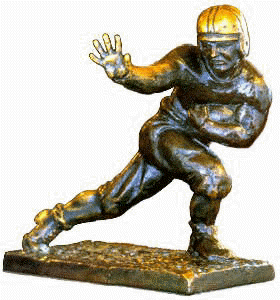 JP: Well I think the best way is to go to Heisman.com. It will give you the information whether you want to come as an individual, buy a table, be a sponsor, there are different levels. It’s a great event to attend. You get to see some of the greatest football players arguably of all time, some great former Heisman winners. I know a lot of the guys go. I’ve gone to the last three. I go in streaks. I can’t make them all as I do work for the Raiders during the season. But it’s a fabulous event to watch, especially if you have kids, take grandchildren. It is just a lot of fun to be there, to see them, to talk to them, to hear them talk, get autographs at times, it’s just a wonderful experience. I’ve sent some people here from California where I live – I live over by Stanford – out to the Heisman. Sometimes through some of the raffles we’ve had out here, to make them part of the thing. One of my best friends has gone back twice. They’ve enjoyed the experience so much. So I highly recommend it. Come out and see some of these great former athletes and have a great time.
JP: Well I think the best way is to go to Heisman.com. It will give you the information whether you want to come as an individual, buy a table, be a sponsor, there are different levels. It’s a great event to attend. You get to see some of the greatest football players arguably of all time, some great former Heisman winners. I know a lot of the guys go. I’ve gone to the last three. I go in streaks. I can’t make them all as I do work for the Raiders during the season. But it’s a fabulous event to watch, especially if you have kids, take grandchildren. It is just a lot of fun to be there, to see them, to talk to them, to hear them talk, get autographs at times, it’s just a wonderful experience. I’ve sent some people here from California where I live – I live over by Stanford – out to the Heisman. Sometimes through some of the raffles we’ve had out here, to make them part of the thing. One of my best friends has gone back twice. They’ve enjoyed the experience so much. So I highly recommend it. Come out and see some of these great former athletes and have a great time.
Dec 10th

Reggie Bush Forfeits Heisman Trophy
Reports surfaced last week that the Heisman Trust was going to strip Reggie Bush of his 2005 Heisman Trophy. Despite denials by the Heisman Trust that any decision has been made, Bush decided to forfeit his Heisman Trophy today.
In a statement released by the Saints, Bush described winning the Heisman in 2005 as “one of the greatest honors of my life” and “a dream come true.” Here are some additional excerpts from the statement:
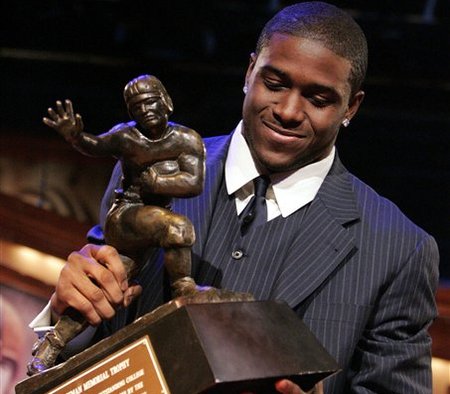 “But I know that the Heisman is not mine alone. Far from it. I know that my victory was made possible by the discipline and hard work of my teammates, the steady guidance of my coaches, the inspiration of the fans, and the unconditional love of my family and friends. And I know that any young man fortunate enough to win the Heisman enters into a family of sorts. Each individual carries the legacy of the award and each one is entrusted with its good name. It is for these reasons that I have made the difficult decision to forfeit my title as Heisman winner of 2005. The persistent media speculation regarding allegations dating back to my years at USC has been both painful and distracting. In no way should the storm around these allegations reflect in any way on the dignity of this award, nor on any other institutions or individuals. Nor should it distract from outstanding performances and hard-earned achievements either in the past, present or future.”
“But I know that the Heisman is not mine alone. Far from it. I know that my victory was made possible by the discipline and hard work of my teammates, the steady guidance of my coaches, the inspiration of the fans, and the unconditional love of my family and friends. And I know that any young man fortunate enough to win the Heisman enters into a family of sorts. Each individual carries the legacy of the award and each one is entrusted with its good name. It is for these reasons that I have made the difficult decision to forfeit my title as Heisman winner of 2005. The persistent media speculation regarding allegations dating back to my years at USC has been both painful and distracting. In no way should the storm around these allegations reflect in any way on the dignity of this award, nor on any other institutions or individuals. Nor should it distract from outstanding performances and hard-earned achievements either in the past, present or future.”
I like it. I like the whole approach. Bush is basically taking the high road while still being a bit defiant. I don’t want to sully this amazing award with drama, but I’m still the best, I was the best and I will continue to be the best.
Here’s more from the statement:
“For the rest of my days, I will continue to strive to demonstrate through my actions and words that I was deserving of the confidence placed in me by the Heisman Trophy Trust. I would like to begin in this effort by turning a negative situation into a positive one by working with the Trustees to establish an educational program which will assist student-athletes and their families avoid some of the mistakes that I made. I am determined to view this event as an opportunity to help others and to advance the values and mission of the Heisman Trophy Trust.”
So Bush vaguely admits that he made mistakes, but he goes a step further to call out a broken system where unpaid student athletes are semi-invited to make mistakes. I like the fact that he took action and gave it back. I like the defiance too. For whatever mistakes Bush semi-owned up to, there’s no changing the fact that he was one of the greatest college football players of all time.
“I will forever appreciate the honor bestowed upon me as a winner of the Heisman. While this decision is heart-breaking, I find solace in knowing that the award was made possible by the support and love of so many. Those are gifts that can never be taken away.”
His legacy may be sullied, but memories of his dominant college football career cannot ever be erased.
Sep 14th
